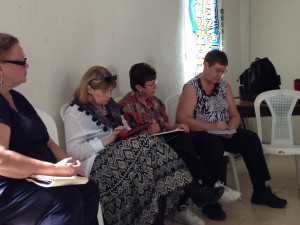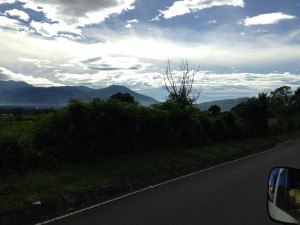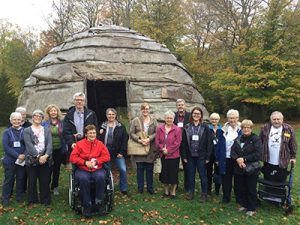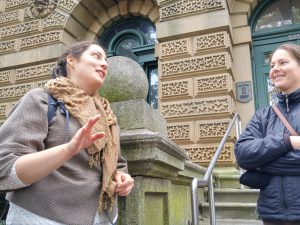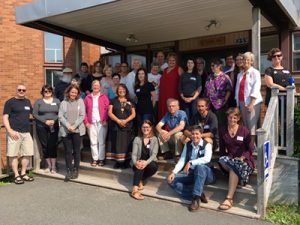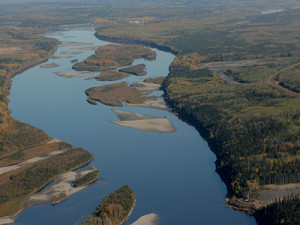Where is Your Brother?
by Georgina Baisley
Georgina Baisley is a retired teacher who is very active in the St James and St John United Churches, Miramichi Presbytery, and the Maritime conference. She worked for seven years in China as overseas personnel with the Amity Foundation, a partner of the United Church.
On the drive from Guatemala City to the areas surrounding the Tahoe mine, we once again experienced the lush beauty of the Guatemalan countryside. In the foreground, along the winding road, there are palm trees, hibiscus and other wild flowers, farmer’s crops and streams. In the distance are the low inviting mountains etched against the morning sky. In Santa Cruz, we can discern the Christ figure on the mountain top, although it is dwarfed by transmission towers.
In San Rafael de las Flores, the Committee de la Vida y Paz waits to greet us in the church. We hear a condensed version of their interactions with the company that set up the San Rafael mine. In 2007-2008, strangers appeared in the community. They tried to influence people with gifts and touted the benefits of mining development.
At the time, the economy of this area was thriving. The Xinca people and campesino are farmers who love the land and who grow tomatoes and other vegetables for export.
By 2010, the committee had gathered enough signatures to request that the Mayor initiate a consultation with the company. None was granted. Instead, people who had signed the list began to receive threats.
One response to the resistance was that 10 women, suspected of being organized and supported by mine officials, made false accusations against four committee members, including the priest. When the case went to court, these women, all poor, were represented by five of the top lawyers in the country!
As part of its continuing effort to have its rights recognized, the Committee de la Vida y Paz organized informal consultations in 8 of the 14 affected communities. The highest vote supporting mining development was 2.5 percent. Even with 97.5 percent or more of the population opposing the mine, the formal consultation process continued to be blocked and the mine was granted a license for exploitation on 7 April 2013.
Ongoing protests continued on land next to the mining site. On April 27 the mine’s security forces opened fire and six men were shot. Following this incident, on April 29, the company, in an apparent attempt to sweeten the pot, offered to pay the state 5 percent royalties instead of the standard 1 percent. The Canadian Ambassador was an honorary signatory to this pledge.
When resistance continued, the President called for a state of siege. Rights were suspended for one month. One of the main resisters is still in hiding.
Resistance grew. A variety of other avenues were attempted to prevent the mine from opening. None were successful. All the officials appear to support the mine rather than the people.
A major element in the resistance movement is the fundamental right to clean water; water that is safe for people, animals and crops. The people worry about the aquifers. Six springs have either dried up or have lower water levels. One eighty year old man was moved to tears when the spring from which he has drawn water all his life dried up. A farmer had his entire tomato crop destroyed in one day because the ph level of the water was 9 rather than the average level of 5. His loss amounted to about 2,000 Quetzales.
Similar stories of repression, intimidation and criminalization were related in Nueva Santa Rosa. Among the complaints: the environmental impact assessment has many deficiencies; cyanide, arsenic and other heavy metals threaten water sources with contamination; the amount of water the mine uses in one hour would supply a family for 20 years; after the mine closes the company is responsible for the environmental impact for only 3 years.
One person said “As Christians speaking to Christians, I ask you to divest from this type of project. The mine has affected our coffee, our corn and other crops. Please do a thorough investigation of the impact of mining.”
Another asked, quoting Genesis “Where is your brother?” and added “Life is more important than money. We must continue this struggle until the end of our days.”
On the drive back the breathtaking beauty of the scenery is enhanced by a lovely sunset. The beauty of Guatemala – will it last? Or will be destroyed forever by mining and other mega projects?
